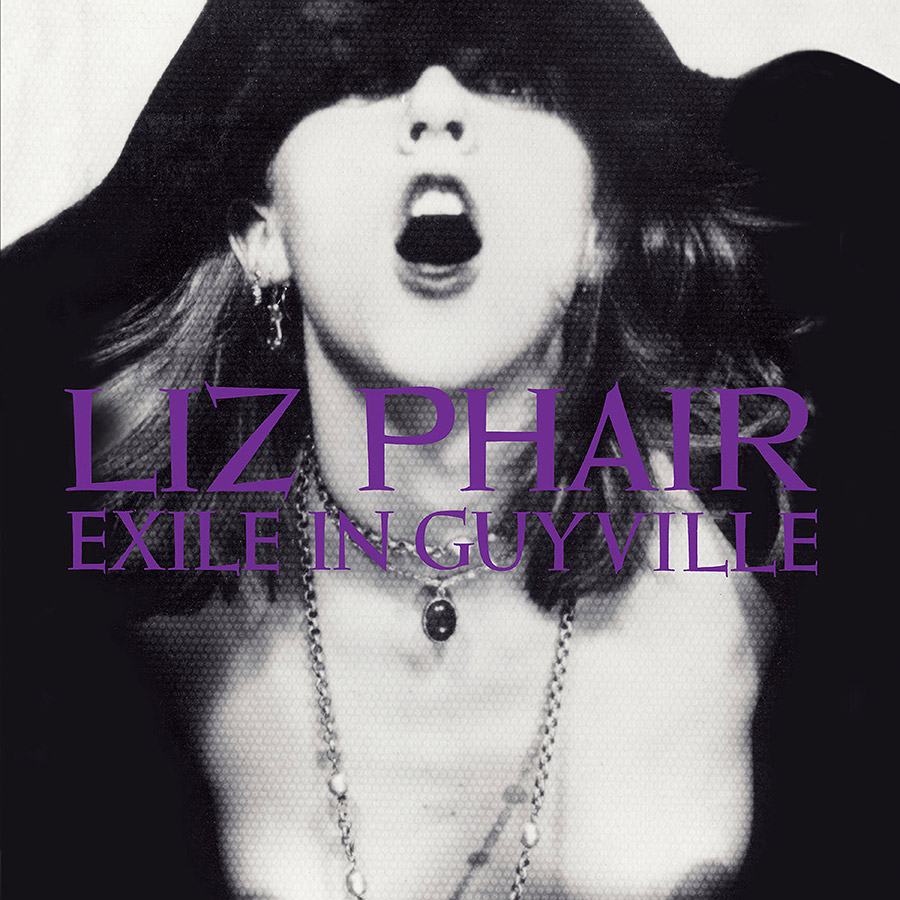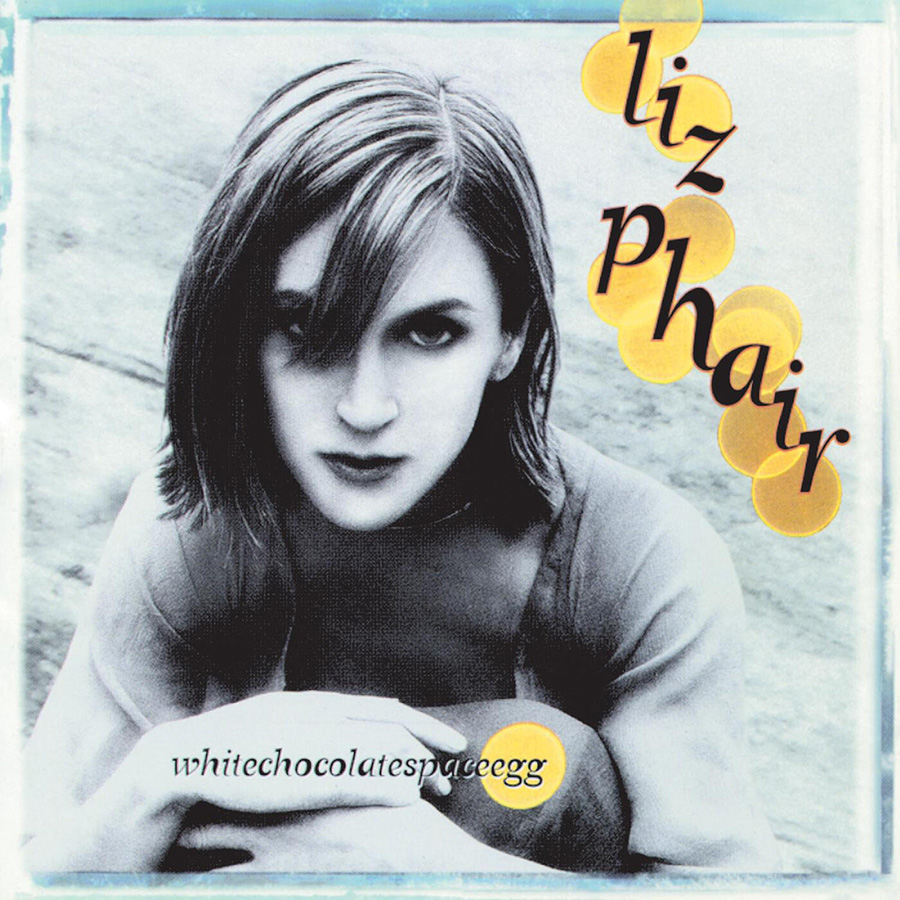14. “Flower”
I recall playing “Flower” for a friend when I was home on spring break, circa 2002, having just recently become absorbed in the wonders of Liz Phair’s Exile in Guyville. Her response? “That’s the filthiest thing I’ve ever heard.”
This friend was no prude, mind you: she was a raven-haired, pale-skinned, strategically pierced Nine Inch Nails enthusiast studying Psychology. And yet, something about the song stirred a very clear and very immediate sense of disgust within her and an impulse not only to skip the track but to change the CD altogether. I was also instantly mortified at just how poorly I had mis-anticipated her reaction (and it made me wonder if I, a 20-year-old male, was misunderstanding and connecting to a piece of text that simply was not meant for me*).
When preparing to write this week’s Between the Grooves entry, it crossed my mind to perhaps let the lyrics stand for themselves, a piece of potty-mouthed poetry doubling as a Litmus test for potential Guyville listeners: if you can read the lyrics to “Flower” — aloud, preferably — and you’re more intrigued than put off, blushing but not balking, pull up a seat, grab some headphones, and take it from the top.
“Flower” is arguably the Guyville tune least in need of argument at all. It is the most vulgar by a mile, sure, but it is also one of the record’s most important offerings, a song that transcends (or sacrifices, depending on perspective) the necessities of narrative, context, and genre in order to achieve its unconventional form. Musically, it’s little more than sustained amplifier feedback with short, measured bursts of aquatic-tinged distortion (I’ll refrain from any “wet” punnage). Lyrically, it’s a heady, unnervingly frank twister of sexual scenario and the album’s most provocative tonal puzzle: imageries of dominance and submission crisscross over one another with discomfiting insistence, aided by Phair’s darkly comic layering of her choirgirl-falsetto over her husky main vocal. It’s an obvious production move, sure, but utterly effective in its lack of irony or subtlety. Phair isn’t out to teach us a lesson about the Madonna/whore complex, to profess anything of the tension between homemaker and homewrecker; rather, she’s articulating something primal and confusing that exists in each of us, an instinctive vacillation between sleazy and sweet expressions of physical love.
This brings me back to my friend, rejecting “Flower” when I thought it would, at worst, elicit nervous laughter and at best, excite and empower her. Why was it that she could sing along, without shyness, to NIN’s Trent Reznor proclaiming his desire to “fuck you like an animal” but was so turned off upon hearing a voice closer to hers make similar erotic demands? Men detailing what they’d like to do to or have done to by women is old hat in every corner of our culture, music certainly no exception. But women, historically, aren’t supposed to speak of sex the way men do, right? And, after all, isn’t that the implicit invitation in the very explicit “Flower” and of Guyville as a whole? Remember that Phair isn’t alone on that track; she’s harmonizing with another voice, the sing-a-long serving as a kind of solidarity.
Phair extends this communal intention to recent live performances of “Flower”, typically plucking a young woman or two from the crowd to join her on stage and sing beside her. While Phair instructs and nurtures her impromptu TAs through the song with confidence, there’s a palpable sense of exhilaration, embarrassment, and badassery coursing through their veins. It’s a reminder of what “Flower” and Phair and Guyville have given them: the permission, if even for just a hair over two minutes, to tap into and vocalize baser instincts without the threat of stigma and with the security that you’re never doing so alone.
15. and 16. “Johnny Sunshine” and “Gunshy”
“Johnny Sunshine” and “Gunshy”, the fifteenth and sixteenth tracks on Liz Phair’s Exile in Guyville, respectively, share the distinction of being two of the album’s catchiest and most melodically affecting moments. “Sunshine” has a frantic but solid rock ‘n’ roll vibe about it, garage-grungy-guitars wailing over big, assured drums, Phair offering up just about every possible use of her vocal register to help build, maintain, and then ultimately break down the song’s structure. “Gunshy”, conversely, is a soul sister to the record’s previous deceptive moments of tranquility (“Glory”, “Explain It to Me”, “Canary”), all squeaky chords and amplifier gurgles to accompany Phair’s faint murmurs.
Without any attention paid lyrically, “Sunshine” is fun and odd, “Gunshy” unconventionally pretty and sort of soothing. What the two have most in common, though, is a kind of trickery: isolate the imagery, and you’ll find that each contains some of Guyville’s most bizarre—firm reminders of Phair’s flair for hyperbole, invoking abuse in ways both subtle and cartoonishly surreal. This late in the Guyville game, we’re numbed to it all, grooving along to Johnny’s latest hateful antics, floating away on the cool-breeze sonic climate of our “Gunshy” protagonist’s miseries. It seems that Phair, too, realizes we’ve reached a place where all shock value has expired, the placement of these tracks side by side (especially following the inhibition-deflating “Flower”) mirroring the “nothing surprises me anymore” tone in Phair’s voice and the narratives themselves.
“Sunshine”, of course, reintroduces us to the Johnny character (and Guyville archetype) that first appeared on “Dance of the Seven Veils” (he returns, even more sadistically, to Phair’s erotic delight on 1998’s Whitechocolatespaceegg). On “Veils”, Phair seduced Johnny through submission; on “Sunshine”, she’s lost all power: Johnny’s thrown her out of the house, changed the locks, and absconded with her car—he’s even murdered their cat by dipping it in antifreeze. The latter is particularly disturbing, even if Phair is being facetious (we can’t help but recall the proverbial cat she didn’t let out in “Never Said”). But Guyville is chock full of toxic relationship woes, and the overall picture that “Sunshine” paints isn’t charting new territory: Johnny’s a dick, Phair is overdosing on his mixed messages, and she’s lamenting being cast aside even though she clearly recognizes that her time with him has left her emotionally and materially destitute.
That’s where “Sunshine”, well, shines among the other tracks of its ilk: Phair groans that she’s “been taken for everything [she] own[s]” and “hustled badly”, that colloquial “hustle” often linked to gambling and the monetary. Love’s always a gamble in Guyville, so it makes sense that two would crossover (interestingly, the more forthright “Divorce Song” never even insinuates the material in its dissection of the matrimonial, lighters and maps aside). This isn’t an uncommon thread on Guyville; after all, the last time we heard of Johnny, Phair was begging him to “get out of the business”. If we adjust our thinking ears, we can hear Phair’s dissatisfaction with Johnny to truly be (well, at least equally) one of irritation at the loss of her earthly goods as opposed to those of the spiritual kind. Sure, Johnny hightailing it out of town is an emotional drain, but Johnny hightailing it out of town with all her shit?—well, that’s as tangible and realistic a cause for grievance as anything on Guyville.
If we sustain this line of thinking, “Gunshy” serves as an appropriate aftershock following the trauma inflicted by Johnny Sunshine, a fever dream in which Phair envisions the doldrums and captivity of conventional married life had they kept on (not unlike “Canary”). “See monkeys / Do monkeys / Story of my life”, she sighs, comically and sadly encapsulating the plight of the routine-afflicted homemaker. Phair crafts “Gunshy” through a lens of commodity, again dancing with and railing against the notions of possession that apply in the marital realm. For men, it is as easy as “send[ing] three bucks to a comic book” to “get a house car and wife”, while for women, the costs are much greater.
The absence of autonomy and control in “Gunshy” unsettles Phair as much as “taking out the garbage on Tuesday nights”, the song’s character voice telling us “the small things are the only things [she’ll] fight”. As the title suggests, she’s hesitant—to say the least—about ever putting herself in this kind of position again, and given the examples of good love gone bad (or love that was never all that good to begin with) exhibited by “Sunshine” steering clear of that potential path seems prudent. “Gunshy” fades out with a loop of Phair hissing “wife” with an air of disdain, a solidification of her intention to resist convention—to her mind, the most dangerous submission of all.
17. “Stratford-on-Guy”
Much of Liz Phair’s Exile in Guyville touches on the tension between escapism and the eventual, often harsh, returns to reality. Throughout the record, Phair’s narrative voices dream of extrication from emotionally destructive situations, either for themselves (“Canary”, “Shatter”, “Help Me Mary”) or wish it for the detached men they desire in the misguided belief it will restore equity and dignity to their dysfunctional union (“Dance of the Seven Veils”). Guyville itself is an experiment in escape, a sequence of songs inspired by Phair’s desperation to both survive and thrive within a time, place, and scene that oppresses and misunderstands her efforts at every turn.
Her endurance was sustained in the hopes that the album’s success would prove her worthy enough to occupy the same space as the hipster jerks she was singing about and also offer her an opportunity to leave them in the dust, metaphorically and geographically. It’s this kind of active, knowing contradiction that makes Phair’s vision as a storyteller unique and Guyville an important and rare musical document, a piece of personalized propaganda that allowed Phair to sell herself to the very shitheads she was selling out.
So, it makes even more nonsensical sense that “Stratford-on-Guy”*, the album’s penultimate track, should find Phair “flying into Chicago at night”, causing us to scratch our heads as we bop them along to the steady rhythm. Isn’t Guyville some alternate reality version of Chicago, the place where Phair took her blows, made her observations, and managed to eke out dozens of absurdly clever yet musically diffident tunes that would go on to seal her fate as the most real bitch on the block? If she’s flying into Chicago, then where exactly has she been for the past 50 minutes? Are we assuming some sort of gap or lag in the timeline of Guyville’s interwoven narratives? Is this flight back into Chicago a figurative one, bracing of the self to make a “return”, to start over, and face the music armed with the lessons learned from the creation of her own?
Regardless of our efforts to understand the song’s physical setting — after all, she’s suspended thousands of feet in the air, making countless allusions to the experience of feeling like she’s in some celluloid fantasy (the stewardess who looks kind of like Brigitte Bardot, the “landscape roll[ing] out like credits on a screen”, the sense that her “circumstance is movie sized”) — we can clearly intuit Phair’s confidence. She’s been through the wringer and comes out the other side quite Zen. She’s literally floating above the ground, looking down on the past, ready to descend into the present and the future (the devoted listener will hear a parallel between this and “My Bionic Eyes” from her 2003 eponymous pop effort, in which she complains that as she “got light as a feather / They got stiff as a board”, a nod, I think, to the transcendence “Stratford” celebrates).
It’s easy, tempting even, to reduce “Stratford” to its bare essentials, to write it off as a great song structured around, and works because of, its simplicity: Phair reflecting on the weirdness of flight, the oddity of the sky’s natural beauty, the strange juxtaposition of a plane’s claustrophobia despite hurling us as close to the heavens as possible. But even with that reduction comes complication and reaffirmation of Phair’s ability to both cut something to its core and reflect its vast open-endedness upon the blank walls of our minds. When she declares that “It took an hour / Maybe a day / But once I really listened / The noise just fell away” — an impeccable, empowering lyric on an album that plays at times like a collection of greats spanning a very long career, let alone a debut — she is bespeaking a very distinct clarity of mind after weathering a cycle of potentially soul-damaging storms**. That chorus so succinctly encapsulates the stresses, disappointments, and grit of Guyville without necessitating the redundancy of any crude imagery. For a song so non-specific in terms of story, it manages to be spectacularly vivid and spot-on. The smallness and nothingness in the details are everything.
*“Stratford-on-Guy” appears to be a play on Stratford-upon-Avon, birthplace of William Shakespeare. Phair penned her Girly Sounds in Chicago, her “Stratford-on-Guy” — a subtle but purposeful joke on her part and confirmation of the track’s assuredness.
**The original Girly Sound recording contained a rather bleak chorus: “You better look / Look to your right / ‘Cause I’m going to take this plane out / In less than five minutes / And this, this is your very last sight”. As this was written prior to Phair’s eventual enlightenment through the trajectory of the more refined Guyville, the contrast is quite telling.
18. “Strange Loop”
As my introductory essay posited, and many subsequent entries reiterated, Phair the creator and the Phair the album narrative’s protagonist (and antagonist, at times, depending on what perspective she’s embodying on a particular track), respectively, are stuck in hazy cycles of manic confidence and victimhood, acts (and daydreams) of extreme (often sexual) aggression and defeatist passivity, and the romanticizing and demonizing of domestic stability.
On my billionth listen, I came to realize that the perfect title had, of course, been there for me all along (I should never have doubted the answer would reveal itself, given the intricacy and care Phair took with every composed aspect of the record). Phair’s—and her song characters’—journey was all one big strange loop. And what a thoughtful and purposeful term choice on her part (no surprise there) to boot: “loop” carries with it musical connotations (so much of Guyville is about making music and loving and hating men who make music); the notion of being “in the loop”, in the know and on the scene; it also, of course, is grounded in repetition and circlings and cycles; and, finally, subtly, the dreaded and desired rings of commitment are in themselves loops. One could go on and on with Phair’s clever word choice—which she, in true Phair style, never utters once in the song—but at this point, we get the picture.
And Phair knows it.
By the time the unexpectedly bright “Strange Loop” begins, and our Guyville journey ostensibly comes to its close, we have been so immersed in the quirks, characters, and corners of this fictitious, conceptual land that Phair’s final act is to catch us off guard. If Guyville were a thriller, “Loop” would be its masterful twist ending, its final stab at testing just how closely the viewer has been paying attention, a challenge to watch (or, in this case, listen) all over again to figure out how it all worked, how all the pieces snapped into place to create such a seamless structure (another act of looping if you will).
The opening notes of “Loop” sound curiously close to “6’1”, the album’s proper opening, and the final seconds of “Loop” even more so. But that’s the easy stuff. What “Loop” really achieves is a masterful accumulation of Guyville’s central concerns, tropes, and musical tricks that, when shaken up and re-presented, sound more hopeful and optimistic than anything else on the album. It’s unclear if this song is from the male or female perspective—Phair decidedly does her husky androgynous vocal thing—and it doesn’t really matter. “Strange Loop” is a bashful bid for redemption, an unreliable lover seeking another chance but copping to only a piece of the blame (“I can’t be trusted / They say I can’t be true / But I only wanted more than I knew”).
It sounds like a plea either party could be making, and perhaps at turns, each is, in fact, doing just that, but regardless of who this confession is coming from, it’s uncharacteristic coming from either side, the song’s earnest sentiment is as shocking as anything on an album. For the Phair character to plainly own up to having changed, to wanting to give love a shot despite the pained and taxing experiences she’s recounted throughout the record, feels like both progress and regression. Coming from one of the Guys in the Ville, it’s a bit harder to swallow, and though we really, really want to believe it for Phair’s sake, knowing what we know — and knowing what Phair herself has whispered into our ears, the inside she looks she’s given us into truths we can’t ever un-know — we’d be fools to fall for it.
As we all also know, though, with each fresh infatuation comes a new hope and temporary blindness. “Strange Loops” ends with an extended instrumental jam, Phair’s guitar and accompanying drums and bass being played within an inch of their lives before quickly extinguishing themselves into silence. It’s messy, discordant, and desperately jubilant—an apt embodiment of the ideas of love and its imminent loss so uniquely specific to Liz Phair and her Exile in Guyville.










